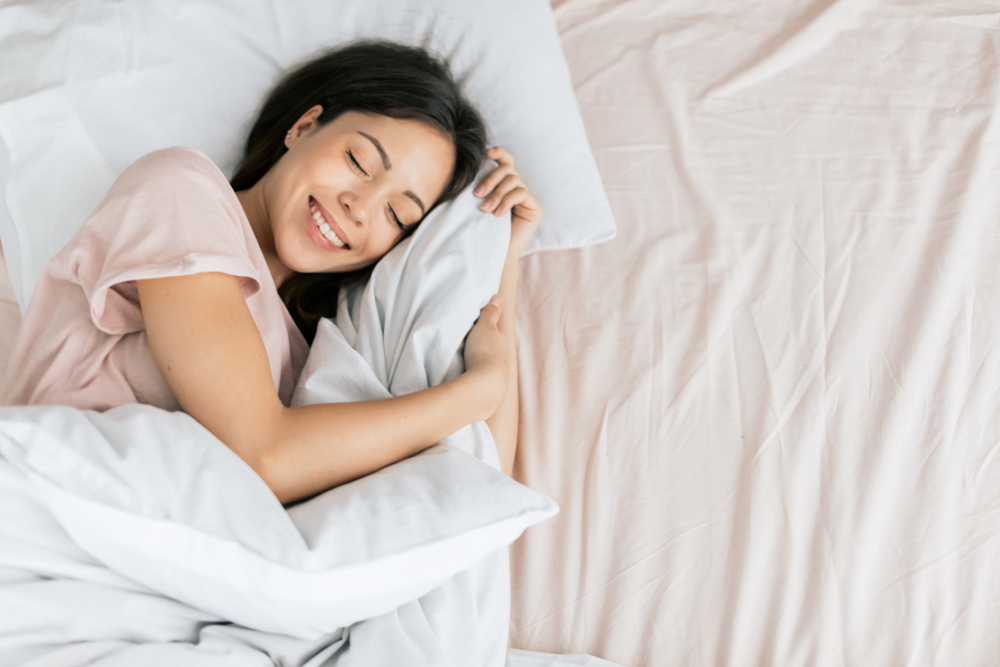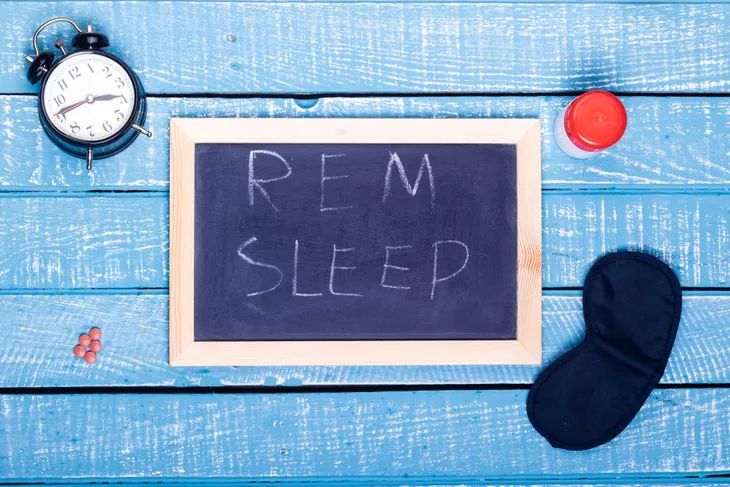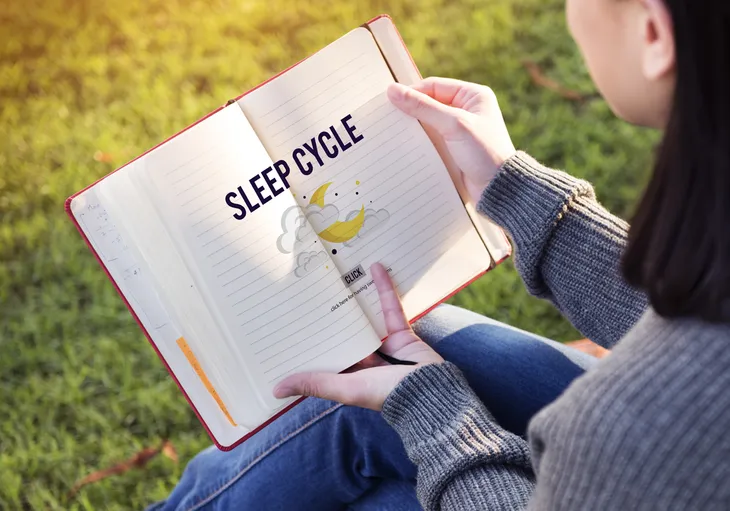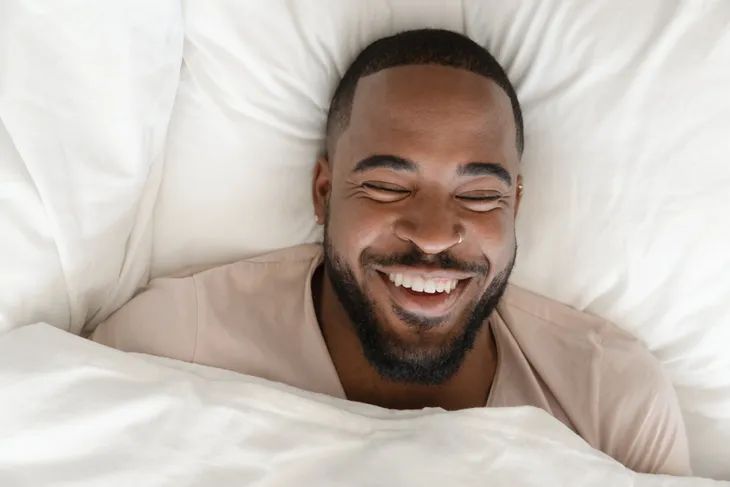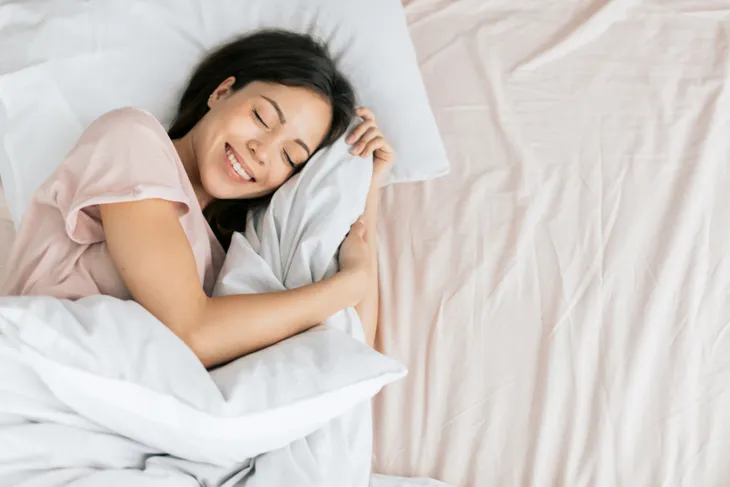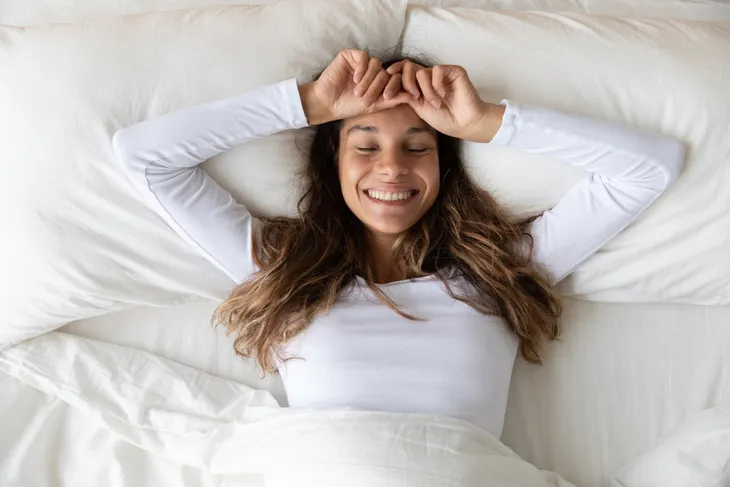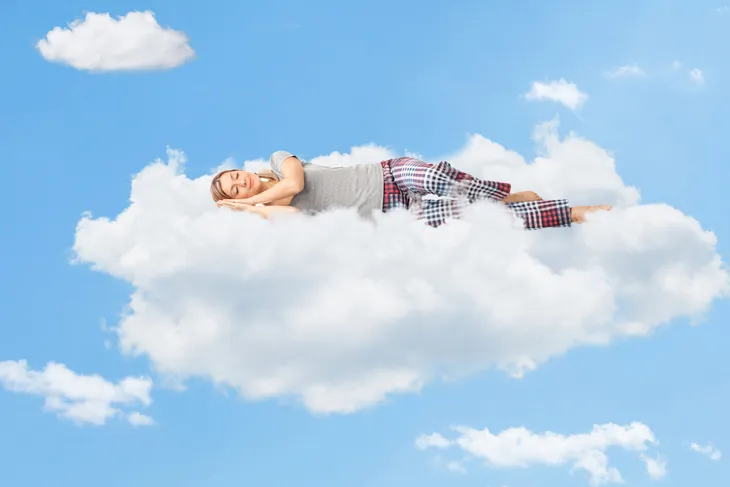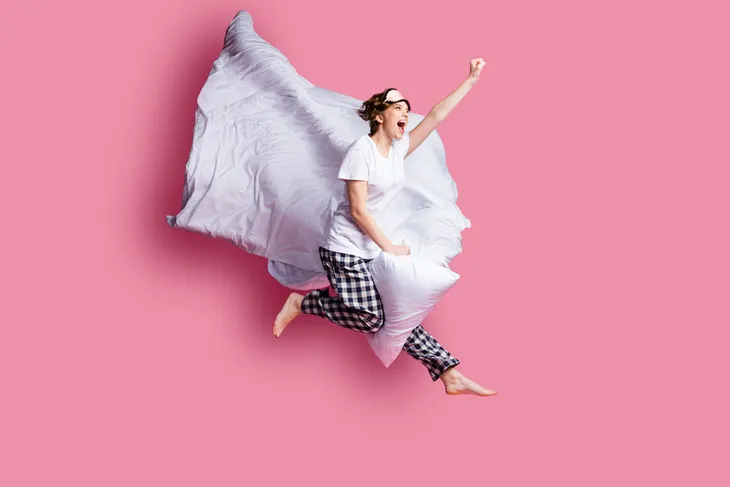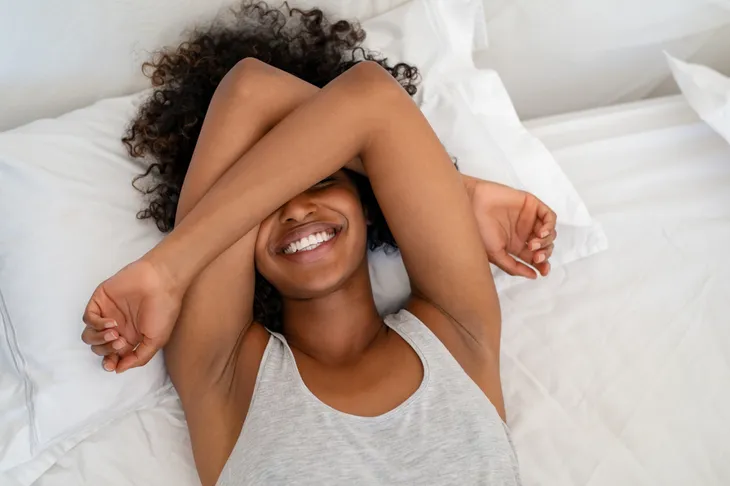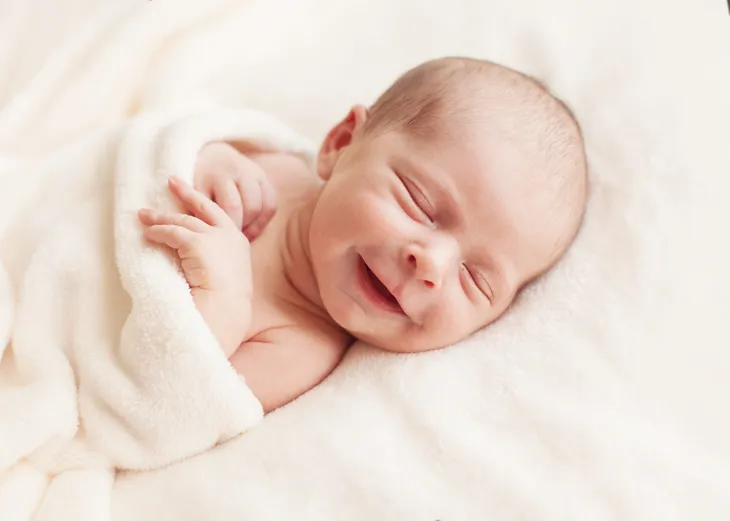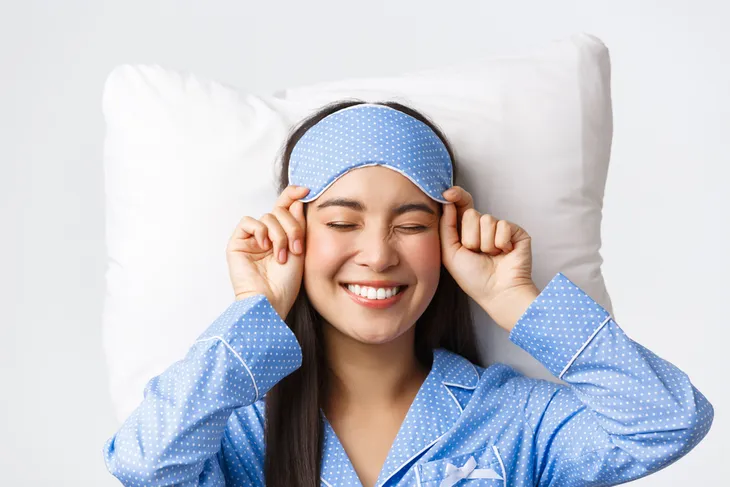- Laughing during sleep sounds strange but it’s not that uncommon and often occurs during REM sleep when we are dreaming.
- In rare cases, laughing during sleep is a sign of REM sleep behavior disorder, parasomnia, or can be linked to neurological conditions.
- Even though there are instances where laughing during sleep can indicate something serious, overall it’s harmless and nothing to worry about.
For a long time people thought sleep was just a passive activity and our bodies and brain went dormant during sleep. This couldn’t be further from the truth! According to Johns Hopkins sleep expert and neurologist Mark Wu, M.D., the brain is engaged in a number of activities during sleep, many of which are linked to quality of life.
We now know the brain cycles through two different types of sleep: REM (rapid eye movement) sleep is when most of our dreaming occurs. Laughing during sleep (also known as hypnogely) is often a result of dreams and surprisingly, not that uncommon of an occurrence. Here’s a look into what it means, potential causes, and if it’s normal…
Two Main Kinds of Sleep
According to Healthline, there are two kinds of sleep — rapid eye movement (REM) sleep and non-REM sleep. Everyone goes through multiple cycles of each throughout the night. Most of our dreaming occurs during REM sleep which starts about an hour and a half after we fall asleep, notes the source.
During REM sleep, our eyes quickly move back and forth and our brain waves are varied, but similar to waking hours. Healthline notes that even though our breathing is irregular and heartbeat and blood pressure is similar to when we’re awake, our legs and arms are temporarily paralyzed. This is so that we don’t act out activity in our dreams.
Stages of Non-REM Sleep
We often hear about REM sleep, but what is non-REM sleep? This sleep occurs in three different stages, explains Healthline. The first occurs when we go from being awake to asleep. This time frame is short. It’s when our muscles relax and our breathing and brain waves slow down.
The second stage is that phase of light sleep before we move into a deeper sleep. Our heart and breathing slow even more, and muscles relax more. Eye movements under the lids stop and “brain activity slows down with sporadic periods of electrical activity,” writes the source.
Stage three is the final stage of sleep that provides us with that refreshed feeling when we wake up. Even though it’s the last stage, it actually occurs in the first part of the night. “During this time, your heartbeat and breathing are at the slowest point, as are your brain waves,” adds the source.
When Does Laughing Occur?
Laughing during sleep typically occurs during REM sleep as it’s the deepest stage of sleep. It’s also the only time during sleep that people dream. It’s also the last stage in the sleep cycle, explains Medical News Today. “During this time, most people experience muscle atonia, which means that the body has shut down and is effectively in paralysis,” writes the source.
It often occurs in the second half of the night and if it’s loud enough, Medical News Today says it can wake the person up. Healthline notes there are times when laughing can occur during non-REM sleep. When this happens it’s referred to as parasomnia, a sleep disorder that causes abnormal movements, perceptions, or emotions during sleep.
Is It Normal?
While it doesn’t sound like a normal thing to do, laughing during sleep actually isn’t that uncommon. Most of the time it occurs as a response to a dream, explains Medical News Today. And not even necessarily a funny dream! The dream might not seem that funny upon waking. It could’ve been odd or even bizarre.
Since it’s not something that is widely reported, it’s hard to say exactly how common it is. According to Medical News Today it does happen fairly frequently. The source references one study that found 33 to 44-percent of a small sample of middle school children laughed in their sleep at least once in the previous 6-months. It also showed 73-percent “of a nonclinical sample of undergraduate students reported being aware of at least one hypnogely event per year,” writes the source.
Is it Harmful?
Overall, laughing during sleep is not harmful or dangerous. It’s not even that uncommon and is often seen in babies and children. Most of the time when it occurs, there’s nothing wrong. However, there have been studies that suggest laughing during sleep is a sign of a neurological disorder or other sleep disorder, such as parasomnia.
There is also the small chance that it could be the result of gelastic seizures. These are very rare and known to affect infants, explains Liquids and Solids. This type of seizure lasts anywhere from 10 to 20-seconds and causes episodes of uncontrollable giggling. A small number of people will also experience these types of seizures during adulthood.
Potential Causes
Dreams
Even though we don’t always remember them, we all dream while we are sleeping. Laughing during sleep is usually a response to something that we’re dreaming about. Early Freudian theories thought that sleep laughing was an “unconscious manifestation of primal instinct or fears,” notes Medical News Today. Of course nowadays this carries very little credibility.
What’s more likely is that laughing is a response to a strange dream. People usually don’t even know they are doing it. If they do, it’s likely because their sleep partner hears them chuckling or giggling, and in some cases if it’s loud or real enough, they’ll wake themselves up.
REM Sleep Behavior Disorders
Another potential cause for laughing during sleep is REM sleep behavior disorder (RBD). People with this condition do not experience the same muscle atonia that the rest of us do. “This causes them to act out their dreams with physical movements such as wild, flailing limbs,” explains Medical News Today. These uncontrollable movements can result in physical injuries to not only themselves, but also their sleep partner.
Thankfully, this sleep disorder is extremely rare. Less than 1-percent of people have RBD and it is more common in older males, notes the source. It mainly impacts males over the age of 50, averaging around 60. Some known risk factors are neurological conditions such as Parkinson’s disease or multiple system atrophy. Medical News Today states that excess alcohol consumption or alcohol withdrawal, sleep deprivation and some medications can also increase a person’s risk of developing RBD.
Parasomnia
If laughing during sleep occurs during non-REM sleep it could be associated with arousal parasomnias. Healthline describes this as somewhat like being half-asleep and half-awake. Examples of these types of parasomnias are sleepwalking and sleep terrors. “These episodes are on the shorter side, with most lasting less than an hour,” writes the source.
While they are more likely or more common in children, they can also happen to adults. Your risk of parasomnias can increase as a result of genetics, sedative use, sleep deprivation, altered sleep schedule, and stress, notes Healthline.
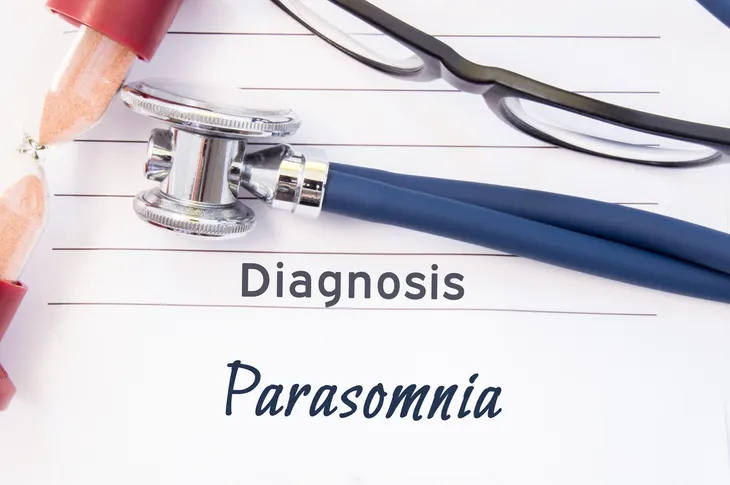 Shutterstock/Shidlovski
Shutterstock/ShidlovskiGelastic Seizures
In some rare cases, neurological conditions cause sleep laughing. In addition to ones that we already mentioned, such as Parkinson’s disease and RBD, other conditions like hypothalamic hamartoma (HH) can cause gelastic seizures. “These are bouts of uncontrolled laughter or giggling,” writes Medical News Today. While they can happen at any time, they often occur when a person is falling asleep.
HH is a congenital condition that people are born with. It surfaces around 10-months-old occurring several times throughout the day. Each seizure lasts for 10 to 20-seconds, explains the source. People have described it as starting with a butterfly-type sensation in their tummy, tickling in their chest, or a headache. “The person might look startled or scared and exhibit automatic behaviors such as lip smacking or swallowing before the seizure starts,” adds Medical News Today.
Babies Laughing in Sleep
The sweetest sight in the whole world is when a baby is softly sleeping and they break out in a smile. All parents will remember witnessing this during those first couple months! Turns out, babies also laugh in their sleep. According to Medical News Today, experts have no idea why it happens but again, it’s not that uncommon. A parent should never worry about their baby laughing or giggling while sleeping.
In rare cases it can be a sign of an underlying health issue. The best way to determine this is by looking at any other presentable symptoms that occur at the same time. For example, it might be concerning if a baby is having several uncontrollable bouts of laughter throughout the day, in addition to exhibiting other unusual behaviors, notes the source. However, laughing or laughing during sleep on its own is not a cause for concern.
Spiritual Meaning Behind Sleep Laughing
While laughing during sleep is usually just a response to a dream, there are many different superstitious beliefs about it. Many people believe it’s a sign of success and good luck, says Smart Sleeping Tips. They believe it to be a strong indicator that good energy or news is on its way.
Another common belief goes in the opposite direction and sees it as a warning or sign that something or someone negative exists within your circle. Smart Sleeping Tips notes it could also mean you are not happy in your life and that dreaming is your escape from reality.
Outlook
Even though there are cases where laughing during sleep can indicate something serious, for the most part it’s harmless and nothing to worry about. This is particularly true if it occurs in babies or children. Among this age group, laughing while sleeping is considered a typical occurrence and not a cause for concern, assures Healthline. Especially if it’s not associated with abnormal behavior.
Anyone who is concerned about sleep disturbances or any issues with their sleep should talk to their doctor. Sleep is extremely important to our overall health so it is imperative we get good quality sleep each night. Plus, in some rare cases sleep disturbances can indicate another health problem. A doctor can decide whether further evaluation is needed.
